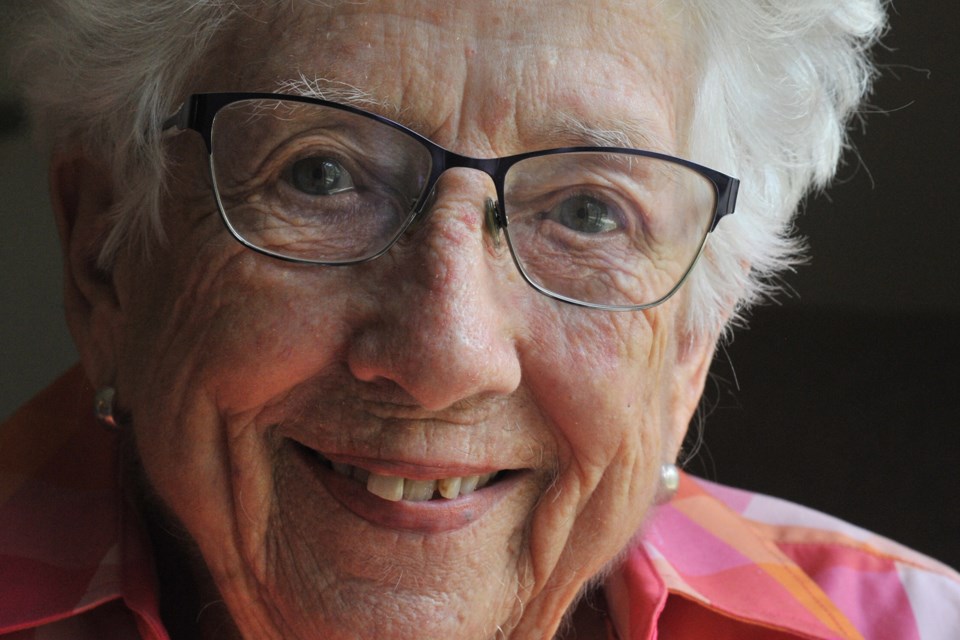Municipal politics is where ‘the rubber hits the road’, as pundits may ponder.
It includes everyday things like garbage pickup, snowplowing, fence disputes or all the things that are so immediate to our everyday lives.
But one former Barrie mayor would suggest those municipal issues that are close to our curbs or backyards shouldn’t be about partisan posturing, which may drag on during endless debates at Queen’s Park or in Ottawa.
It’s about the city, according to Janice Laking, who knows that firsthand.
The longtime educator — 30-plus years at the chalkboard, including a run at Barrie North Collegiate from 1960 to 1988 — and city politician has left an indelible mark on the city by the bay from her 28 years on city council (beginning as an alderman, as they were referred to in those days) in 1972.
Twelve of those years saw her sitting in the big chair as mayor, from 1988 to 2000.
Her previous gig as a high school teacher and phys-ed coach came in handy, she says.
“Councils are like a school classroom. You don’t choose your students; you try to get the best from each and every one of them,” she says from her room at the Waterford Barrie Retirement Residence on Edgehill Drive, a short walk from her Letitia Street home which she and her late husband, John, moved into in 1956.
He died recently, just six days short of what would have been the couple’s 65th wedding anniversary.
Life’s ups and downs have not taken away any charm and vigour from this schoolmarm, however. There is a light in her eyes and a quick smile when it comes to recounting her time on council, and perhaps the herding of cats.
“Lots of (folks) say business people are the best members of council, but that has not been my experience,” she says. “Business people are used to being able to do what they want to do the next day, but council doesn’t work that way. Council has to be a consensus and take the time to germinate (the ideas).”
But those business people did bring a lot of talent to the table, Laking adds.
During one of her terms as mayor, Laking’s council had more women than men, something for which she is very proud.
“That hasn’t come close to happening since then. I had a really good cross-section of people from many businesses in town,” she says of her councillors during the day. “I wanted them to have some experience. I wanted them to have either some kind of business experience or from a family perspective, having a lot of kids to deal with. Or something that gives them some kind of life experience and an understanding of the people they would be dealing with.”
Partisan politics — left or right — have no place when it comes to running the city, Laking says.
“There (should be) no party politics in municipal government and I hope there never will be. One of the things I never wanted at the table was any politics,” she says. “I had one of my new members at council who I was interviewing for a committee who came into my office and said ‘I am (of a political party) and you’re (of a political party) and we’re not going to get along’. And I said, ‘You don’t do that. Leave that politics out in the parking lot’.”
Laking’s contributions to public service have gone beyond city hall, and the classroom, since she set the mayor’s gavel down for the last time.
As a young woman, thoughts to become a lawyer, as her father was, were sidetracked by her love of teaching.
“Once I taught, that’s what I wanted to do. I was happy,” she says, but added that a court of sorts would later come into play.
She was a citizenship court judge — “It was a wonderful experience. I still stand up and sing O Canada with pride” — and later a community member of a ‘consent and capacity’ provincial tribunal dealing with mental-health patients who are in hospital against their will.
Laking is also proud of a civic program she helped organize.
In the 1990s, Barrie twinned with Zweibrucken, Germany and Muryama, Japan.
“This led to many exchanges for choirs, bands, hockey teams and citizens and each summer, about 20 students either visited or entertained students so over the years that meant that dozens of Barrie students had that international opportunity,” she says.
“David Morrison, a member of my council throughout my years as mayor, and a history teacher at Innisdale Secondary School, took this initiative a step further," Laking adds. "He organized a one-semester course open to any Barrie-area student entitled Global Initiatives."
Students in that class entertained German students and spent a month in Zweibrucken, Laking says, adding that hundreds of Barrie students have now developed long-lasting friendships.
While many would say Laking accomplished much during her time as mayor, she has a favourite memory.
“The most important thing my council did, and it was very unusual, was we bought the railroads from Barrie to Bradford and Barrie to Collingwood,” she says. Under the Municipal Act, "we were only allowed to do things outside your municipality if it had to with transportation.
“CN was busy tearing up the tracks and if we hadn’t bought that one to Bradford there wouldn’t be any GO service today because those tracks would be too expensive (replace) to put in.”
To this day during her travels, Laking meets up with people — whether it’s at Waterford or on the street or former students or their parents — and is content with contributions she has made to the community she loves so much.



